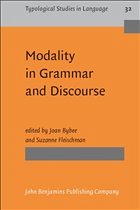Main description:
This volume brings together a collection of 18 papers that look into the expression of modality in the grammars of natural languages, with an emphasis on its manifestations in naturally occurring discourse. Though the individual contributions reflect a diversity of languages, of synchronic and diachronic foci, and of theoretical orientations 2; all within the broad domain of functional linguistics 2; they nonetheless converge around a number of key issues: the relationship between 'mood' and 'modality'; the delineation of modal categories and their nomenclature; the grounding of modality in interactive discourse; the elusive category 'irrealis'; and the relationship of modal notions and categories to other categories of grammar.
Table of contents:
- Introduction
- I. Agent-Oriented and Epistemic Modality
- Agent-Oriented vs. Epistemic Modality
- The Expression of Root and Epistemic Possibility in English
- Contextuel Conditions for the Interpretation of poder and deber in Spanish
- The Obligation Modality in Western Nilotic Languages
- The Gestural Expression of Modality in ASL
- II. The Interactional Basis of Modality
- The Development of Epistemic Sentence-ending Modal Forms and Functions in Korean Children
- The Interactional Basis of the Mandarin Modal néng 6;can'
- The Discourse and Interactive Functions of Obligation Expressions
- Apprehensional Epistemics
- Moods and MetaMessages
- III. Irrealis Modality and Subjunctive
- The Realis-Irrealis Distinction in Caddo, the Northern Iroquoian Languages, and English
- On the Relativity of Irreality
- The Grammaticalization of Irrealis in Tik Pisin
- The Evaluative Function of the Spanish Subjunctive
- IV. Modality and Other Categories of Grammar
- Negation and the Modals of Possibility and Necessity
- A Functional Theory of Complementizers
- The Semantic Development of Past Tense Modals in English
- Imperfective and Irrealis
- Subject index
- Language index
- Author index
This volume brings together a collection of 18 papers that look into the expression of modality in the grammars of natural languages, with an emphasis on its manifestations in naturally occurring discourse. Though the individual contributions reflect a diversity of languages, of synchronic and diachronic foci, and of theoretical orientations 2; all within the broad domain of functional linguistics 2; they nonetheless converge around a number of key issues: the relationship between 'mood' and 'modality'; the delineation of modal categories and their nomenclature; the grounding of modality in interactive discourse; the elusive category 'irrealis'; and the relationship of modal notions and categories to other categories of grammar.
Table of contents:
- Introduction
- I. Agent-Oriented and Epistemic Modality
- Agent-Oriented vs. Epistemic Modality
- The Expression of Root and Epistemic Possibility in English
- Contextuel Conditions for the Interpretation of poder and deber in Spanish
- The Obligation Modality in Western Nilotic Languages
- The Gestural Expression of Modality in ASL
- II. The Interactional Basis of Modality
- The Development of Epistemic Sentence-ending Modal Forms and Functions in Korean Children
- The Interactional Basis of the Mandarin Modal néng 6;can'
- The Discourse and Interactive Functions of Obligation Expressions
- Apprehensional Epistemics
- Moods and MetaMessages
- III. Irrealis Modality and Subjunctive
- The Realis-Irrealis Distinction in Caddo, the Northern Iroquoian Languages, and English
- On the Relativity of Irreality
- The Grammaticalization of Irrealis in Tik Pisin
- The Evaluative Function of the Spanish Subjunctive
- IV. Modality and Other Categories of Grammar
- Negation and the Modals of Possibility and Necessity
- A Functional Theory of Complementizers
- The Semantic Development of Past Tense Modals in English
- Imperfective and Irrealis
- Subject index
- Language index
- Author index

